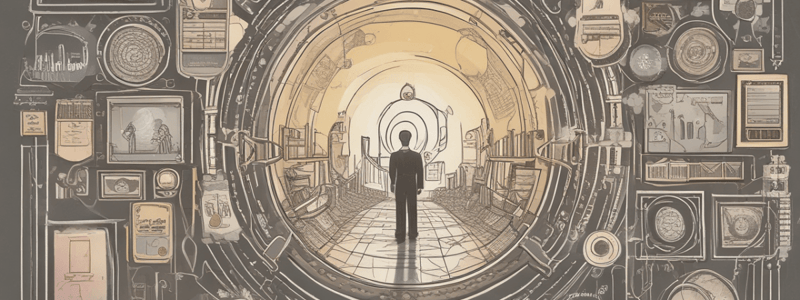Podcast
Questions and Answers
What is organizational culture defined as?
What is organizational culture defined as?
- A system of shared assumptions, values, and norms that vary across departments
- A system of shared assumptions, values, and beliefs that guide employee behavior (correct)
- A system of external factors, values, and beliefs that influence an organization
- A system of individual assumptions, values, and beliefs that shape an organization
What is the term for a culture that emerges within different departments, branches, or geographic locations?
What is the term for a culture that emerges within different departments, branches, or geographic locations?
- Subculture (correct)
- Subgroup
- Organizational culture
- Departmental culture
What is a possible reason for the emergence of subcultures within an organization?
What is a possible reason for the emergence of subcultures within an organization?
- The industry of the organization
- The personal characteristics of employees and managers (correct)
- The age of the organization
- The size of the organization
Which of the following departments may have a shared emphasis on innovativeness?
Which of the following departments may have a shared emphasis on innovativeness?
How many subcultures were uncovered in a single police organization in an interesting study?
How many subcultures were uncovered in a single police organization in an interesting study?
What is the importance of organizational culture?
What is the importance of organizational culture?
What is the primary reason why managers need to understand subculture values?
What is the primary reason why managers need to understand subculture values?
What is a counterculture?
What is a counterculture?
Why might a counterculture be tolerated by an organization?
Why might a counterculture be tolerated by an organization?
What can be uncovered by observing how employees interact and the choices they make?
What can be uncovered by observing how employees interact and the choices they make?
What is the deepest level of organizational culture?
What is the deepest level of organizational culture?
What can be a competitive advantage for an organization?
What can be a competitive advantage for an organization?
Why is having a culture that encourages innovativeness and adaptability beneficial for a company in the high-tech industry?
Why is having a culture that encourages innovativeness and adaptability beneficial for a company in the high-tech industry?
What is an example of an artifact of organizational culture?
What is an example of an artifact of organizational culture?
What can be a result of having the 'wrong' culture?
What can be a result of having the 'wrong' culture?
Why is it important to understand the organization's culture when interviewing for a position?
Why is it important to understand the organization's culture when interviewing for a position?
What is a more powerful way of controlling and managing employee behaviors than organizational rules and regulations?
What is a more powerful way of controlling and managing employee behaviors than organizational rules and regulations?
What is the primary benefit of understanding an organization's culture?
What is the primary benefit of understanding an organization's culture?
What is the primary purpose of conflict management?
What is the primary purpose of conflict management?
What is an example of a value that may emerge from an assumption that happy employees benefit the organization?
What is an example of a value that may emerge from an assumption that happy employees benefit the organization?
What is the primary limitation of observing an organization's artifacts to understand its culture?
What is the primary limitation of observing an organization's artifacts to understand its culture?
What is the goal of the collaborating conflict management style?
What is the goal of the collaborating conflict management style?
What is the primary reason why differences in assumptions and values can create conflict within an organization?
What is the primary reason why differences in assumptions and values can create conflict within an organization?
Why is it important to have people who understand conflicts and know how to resolve them in a business?
Why is it important to have people who understand conflicts and know how to resolve them in a business?
What is the primary benefit of having a culture of respect, civility, and inclusion in the workplace?
What is the primary benefit of having a culture of respect, civility, and inclusion in the workplace?
What can be used to deal with conflict in the workplace?
What can be used to deal with conflict in the workplace?
What is the primary reason for adapting communication style to suit the situation, audience, and purpose?
What is the primary reason for adapting communication style to suit the situation, audience, and purpose?
What is the primary source of conflict in organizational culture related to power and authority?
What is the primary source of conflict in organizational culture related to power and authority?
What is the primary goal of aligning values and goals with the organization's vision and mission?
What is the primary goal of aligning values and goals with the organization's vision and mission?
What is the primary benefit of creating a culture of learning, curiosity, and adaptability?
What is the primary benefit of creating a culture of learning, curiosity, and adaptability?
What is the primary way to address conflicts related to values and goals?
What is the primary way to address conflicts related to values and goals?
What is the primary reason for involving and informing employees in the change and innovation process?
What is the primary reason for involving and informing employees in the change and innovation process?
What is the primary goal of the collaborating conflict management style?
What is the primary goal of the collaborating conflict management style?
When is the competing conflict management style likely to be used?
When is the competing conflict management style likely to be used?
What is the main risk of using the competing conflict management style?
What is the main risk of using the competing conflict management style?
What is the primary characteristic of the accommodating conflict management style?
What is the primary characteristic of the accommodating conflict management style?
When is the avoiding conflict management style likely to be effective?
When is the avoiding conflict management style likely to be effective?
What is the main advantage of the compromising conflict management style?
What is the main advantage of the compromising conflict management style?
What is one of the most common sources of conflict in organizational culture?
What is one of the most common sources of conflict in organizational culture?
What is the primary consequence of not managing diversity and inclusion effectively?
What is the primary consequence of not managing diversity and inclusion effectively?
What is the key to preventing and resolving conflicts related to diversity and inclusion?
What is the key to preventing and resolving conflicts related to diversity and inclusion?
What is the main risk of using the compromising conflict management style excessively?
What is the main risk of using the compromising conflict management style excessively?



